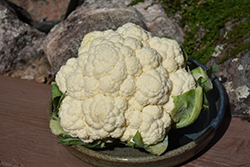>> Home
Snow Crown Cauliflower
Brassica oleracea var. botrytis 'Skywalker'
Height: 24 inches
Spacing: 24 inches
Sunlight:
![]()
Hardiness Zone: (annual)
Description:
An easy to grow variety that features uniform plants with large and bulky heads; heads are densely packed with tight white curds; partially self-wrapping; great for kitchen and market gardens; delicious roasted, baked, grilled or fresh
Edible Qualities
Snow Crown Cauliflower is an annual vegetable plant that is typically grown for its edible qualities. The round green tightly-wrapped heads of foliage are typically harvested when mature. The heads have a sweet taste and a crunchy texture.
The heads are most often used in the following ways:
- Fresh Eating
- Eating When Cooked/Prepared
- Cooking
- Pickling
- Freezing
Planting & Growing
Snow Crown Cauliflower will grow to be about 24 inches tall at maturity, with a spread of 20 inches. When planted in rows, individual plants should be spaced approximately 24 inches apart. This fast-growing vegetable plant is an annual, which means that it will grow for one season in your garden and then die after producing a crop.
This plant is typically grown in a designated vegetable garden. It should only be grown in full sunlight. It does best in average to evenly moist conditions, but will not tolerate standing water. It is not particular as to soil pH, but grows best in rich soils. It is somewhat tolerant of urban pollution. Consider applying a thick mulch around the root zone over the growing season to conserve soil moisture. This is a selected variety of a species not originally from North America.
Snow Crown Cauliflower is a good choice for the vegetable garden, but it is also well-suited for use in outdoor pots and containers. It can be used either as 'filler' or as a 'thriller' in the 'spiller-thriller-filler' container combination, depending on the height and form of the other plants used in the container planting. It is even sizeable enough that it can be grown alone in a suitable container. Note that when growing plants in outdoor containers and baskets, they may require more frequent waterings than they would in the yard or garden.
